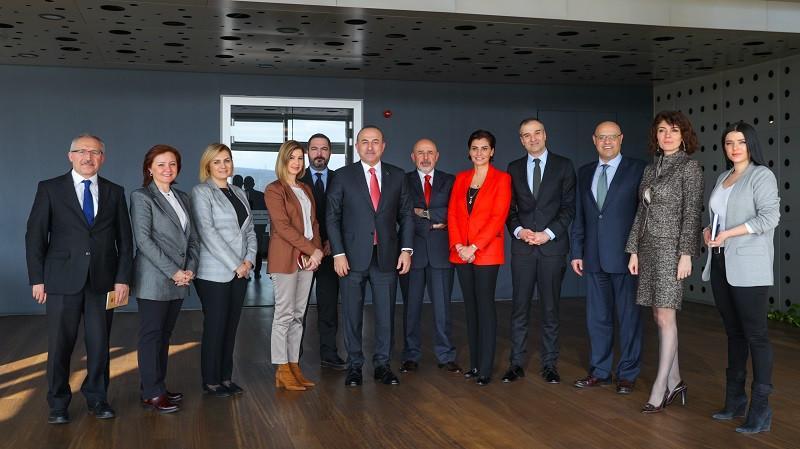
Russia does not categorically reject the idea of establishing a safe zone in northern Syria, but the details of the U.S.-proposed zone are yet to be clarified, Foreign Minister Mevlüt Çavuşoğlu has said.
“Russians have no opposition against the safe zone. We have seen this at the meeting in Moscow,” he said in an interview with Hürriyet Daily News on Jan. 30, referring to the meeting between President Recep Tayyip Erdoğan and his Russian counterpart Vladimir Putin on Jan. 23.
He recalled that following the U.S. proposal for the secure zone, Russians particularly stressed that Turkey’s worries should cease.
“What does the U.S. mean with a safe zone? What will Russia’s role here be? These are uncertain,” he said, adding that questions regarding the safe zone will be discussed in a high-level joint working group meeting on Feb. 5.
“What are we doing? We are trying to coordinate the U.S. withdrawal not only with the Americans, but also with Russians, Iranians and others. Now Iraq has stepped in. Because the developments there will directly affect Iraq,” said Çavuşoğlu.
“We are holding meetings with every actor in the field. However, the opinions and policies remain uncertain. We are still in the process of deliberation,” he added. When asked if Turkey will be the one to set up the safe zone, the minister said it has not been clarified yet and discussions are ongoing.
Recalling the non-papers exchanged between Ankara and the U.S., the minister noted that the general perspectives of the two NATO allies regarding the U.S. pullout from Syria are overlapping. Çavuşoğlu said that the main topic that Turkey and the U.S. have dissented on is the YPG.
Two drawbacks on regime entrance to Euphrates’ east
According to the minister, there are two drawbacks about the regime’s entrance to the east of the Euphrates and Manbij after the U.S. withdrawal.
Ankara objects the possibility the Syrian regime could fill a vacuum in the area left after the U.S. pulls out its soldiers from the east of the Euphrates, because such a scenario would possess threat to the national security of Turkey, the minister said, “because the YPG could cooperate with anyone, including the regime.”
Establishing a security zone in this area is crucial for Ankara because the presence of the regime in this region would not eliminate Turkey’s security concerns, he said, adding: “Because the regime and the YPG can unite against Turkey. Thus, this safe zone is important for us.”
US also rejects regime control in Euphrates’ east
“The U.S. says ‘the regime should not enter here.’ We do not have different views on this,” he said.
Washington is also objecting to the regime’s intervention in the area where the U.S. soldiers will withdraw from on concerns regarding the regime’s alliance with Iran, Çavuşoğlu stated. “Americans say that ‘the regime means Iranians.’ They told us frankly,” said the minister.
Manbij road map recently accelerated
Regarding Syria’s northeastern Manbij town, Çavuşoğlu said there were delays in setting the course of the Manbij road map with the U.S., but now the implementations accelerated.
“The U.S. has acknowledged the seriousness of this and we speeded up the process. Our soldiers and intelligence in the field are discussing the lists of names who will be assigned in [Manbij’s local] security unites and local administrations,” he added.
Ankara and Washington have agreed on the implementation of a road map that brings about the withdrawal of the YPG from Manbij, but Ankara has been complaining of the delay in the process, which also envisages governance and security of the town by locals instead of the YPG.
The minister also stressed that some 400,000 Syrian Kurds can potentially return to the secure zone if established.
‘Some coalition partners supporting HTS to harm Idlib deal’
The major question mark over Idlib is where will Hay’at Tahrir al-Sham (HTS) militants go when they leave Idlib, said the minister.
“Russians have a joint operation offer. They say we should remove them from there,” said Çavuşoğlu, noting that the countries of origin of the foreign fighters in the HTS are not willing to take their citizens back.
When asked if the HTS was strengthened after the Idlib Memorandum, the minister said that in order to be more powerful, the organization needs to recruit more fighters but is unable to because there is no transition from the borders and they no longer gather human recruitment from the countries of origin.
“Secondly, [HTS] needs more armament. Our intelligence knows how much arms they have,” he added. Çavuşoğlu also said some Western countries in the anti-ISIL coalition were provoking members of the HTS to violate the Idlib memorandum, giving them money in return.
The minister said this was done for two reasons. “First, for the termination of the Idlib memorandum. Second, there are countries that are making great efforts to prevent the establishment of a constitutional committee just because we are doing it,” he added.
Çavuşoğlu stressed that before there were many smaller groups, “initially moderate groups” who had to or were forced to enter HTS. “There are many people leaving the HTS, after we came to the field.”